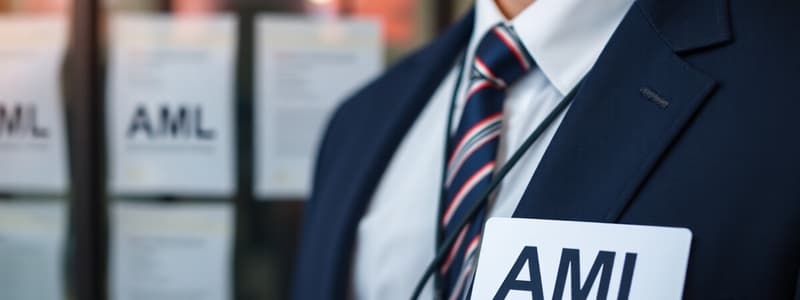Podcast
Questions and Answers
What is the primary goal of money laundering?
What is the primary goal of money laundering?
- To increase tax revenues
- To invest in government bonds
- To disguise illegal proceeds as legitimate income (correct)
- To generate profits through legitimate means
Anti-money laundering laws are only applicable to financial institutions.
Anti-money laundering laws are only applicable to financial institutions.
False (B)
What is accounting fraud?
What is accounting fraud?
The intentional manipulation of financial reporting to create false or misleading results.
Money laundering is considered a serious financial __________.
Money laundering is considered a serious financial __________.
Match the following terms with their definitions:
Match the following terms with their definitions:
What is a common method perpetrators use to commit fraud with invoices?
What is a common method perpetrators use to commit fraud with invoices?
Duplicate payments are made for legitimate vendor invoices.
Duplicate payments are made for legitimate vendor invoices.
What legislation and regulations are industries required to comply with regarding payables and disbursement fraud?
What legislation and regulations are industries required to comply with regarding payables and disbursement fraud?
A common scheme in payables fraud is the use of ______ or inflated invoices.
A common scheme in payables fraud is the use of ______ or inflated invoices.
Match the following industries with their compliance requirements:
Match the following industries with their compliance requirements:
What happens to laundered money in fraudulent schemes?
What happens to laundered money in fraudulent schemes?
Employees cannot collude with vendors to commit invoice fraud.
Employees cannot collude with vendors to commit invoice fraud.
What do perpetrators do when using false vendor invoices for transactions?
What do perpetrators do when using false vendor invoices for transactions?
What is the primary purpose of creating false receipts from vendors?
What is the primary purpose of creating false receipts from vendors?
Suspicious Transaction Reports (STRs) are used to combat money laundering and terrorism financing.
Suspicious Transaction Reports (STRs) are used to combat money laundering and terrorism financing.
Name the three stages of operations in money laundering.
Name the three stages of operations in money laundering.
The process of issuing a write-off on receivable accounts enables accounting personnel to pocket the __________.
The process of issuing a write-off on receivable accounts enables accounting personnel to pocket the __________.
Match the following types of fraud with their descriptions:
Match the following types of fraud with their descriptions:
What can be an indicator of a strong AML/CFT regime?
What can be an indicator of a strong AML/CFT regime?
Creating false credits and discounts is a legitimate financial practice.
Creating false credits and discounts is a legitimate financial practice.
What financial unit in Singapore is responsible for suspicious transaction reporting?
What financial unit in Singapore is responsible for suspicious transaction reporting?
Which of the following is NOT a requirement of KYC?
Which of the following is NOT a requirement of KYC?
KYC procedures do not involve scrutinizing transactions after the business relationship is established.
KYC procedures do not involve scrutinizing transactions after the business relationship is established.
What type of documents can be used as reliable independent sources for KYC verification?
What type of documents can be used as reliable independent sources for KYC verification?
For corporate customers, details of the company's __________ and ownership structure are required for KYC.
For corporate customers, details of the company's __________ and ownership structure are required for KYC.
Match the following KYC requirements with their descriptions:
Match the following KYC requirements with their descriptions:
What is the primary purpose of analyzing STRs and other financial reports?
What is the primary purpose of analyzing STRs and other financial reports?
Kickbacks are legal commissions paid to employees.
Kickbacks are legal commissions paid to employees.
What is a common consequence of kickback arrangements for employers?
What is a common consequence of kickback arrangements for employers?
Layering involves using multiple accounts, banks, and __________ to disguise the origin of illegally obtained funds.
Layering involves using multiple accounts, banks, and __________ to disguise the origin of illegally obtained funds.
Match the following terms with their correct definitions:
Match the following terms with their correct definitions:
Which of the following statements is true regarding kickbacks?
Which of the following statements is true regarding kickbacks?
Regulators require businesses to comply with AML/CFT legislation.
Regulators require businesses to comply with AML/CFT legislation.
What related financial reports are received alongside STRs?
What related financial reports are received alongside STRs?
Flashcards are hidden until you start studying
Study Notes
Money Laundering Activities and Process
- Money laundering is a process that disguises large amounts of money generated from criminal activities.
- It makes illegal money appear legitimate by hiding its source and ownership.
- Funds may be used to further criminal activities or other businesses.
- There are three stages:
- Placement: Money is brought into the financial system.
- Layering: Money is moved through multiple accounts and intermediaries to obscure its origin.
- Integration: Money is re-introduced into the economy through seemingly legitimate transactions.
Role of AML Officer
- The AML Officer plays a crucial role in preventing money laundering.
- Responsibilities include:
- Implementing and maintaining AML compliance programs.
- Identifying and reporting suspicious transactions.
- Training staff on AML regulations and procedures.
- Staying updated on AML legislation and best practices.
Types of Accounting Frauds
- Accounting fraud involves intentional manipulation of financial statements to create false or misleading records.
- It may involve accounting professionals and other company employees.
- Common types include:
- Falsification of Financial Statements:
- Overstating revenue.
- Under-recording expenses.
- Accounts Receivable Fraud Schemes:
- False credits, discounts, and write-offs.
- Stealing payments from credit customers.
- Kickbacks:
- Illegal commissions paid for preferential treatment.
- Payables and Disbursement Fraud Schemes:
- Submitting false or inflated invoices.
- Making duplicate payments.
- Falsification of Financial Statements:
Anti-Money Laundering Laws and Regulations in Singapore
- Singapore takes a whole-of-government approach to combat money laundering and terrorism financing (ML/TF).
- Money laundering is a serious financial crime.
- Suspicious Transaction Reporting (STR):
- Essential for combating money laundering.
- High levels of STR indicate a strong AML/CFT regime.
- Singapore's Financial Intelligence Unit (STRO):
- Receives STRs, Cash Movement Reports (CMRs), and Cash Transaction Reports (CTRs).
- Analyzes information to detect money laundering, terrorism financing, and other serious crimes.
Customer Due Diligence and its Importance (KYC)
- KYC is essential for verifying customer identity and understanding their business relationships.
- It involves:
- Verifying the customer's identity using reliable documents.
- Understanding the purpose and nature of the business relationship.
- Conducting ongoing due diligence.
- Scrutinizing transactions to ensure they align with customer information.
KYC Required for:
- Opening a bank account.
- Applying for a credit card or loan.
- Opening subsequent accounts.
Record Management
- Financial institutions and businesses must maintain detailed records of transactions.
- Implementing software to flag suspicious activities is crucial.
Supporting Documents for KYC
- Individuals:
- Passport/NRIC details.
- Utility bills and bank statements.
- Corporates:
- Business and ownership structure information.
- Recent and current financial statements.
Basic Criminal Offenses
- Singapore has laws against a variety of criminal offenses, including:
- Drug trafficking
- Fraud
- Criminal breach of trust
Industries Required to Comply
- Industries subject to AML/CFT legislation and regulations:
- Banks.
- Finance Companies.
- Casino Operators.
- Law Practices.
- Legal Practitioners.
- Moneylenders.
- Money Changers.
- Remittance Businesses.
- Pawnbrokers.
- Professional Accountants.
- Auditors.
Studying That Suits You
Use AI to generate personalized quizzes and flashcards to suit your learning preferences.




